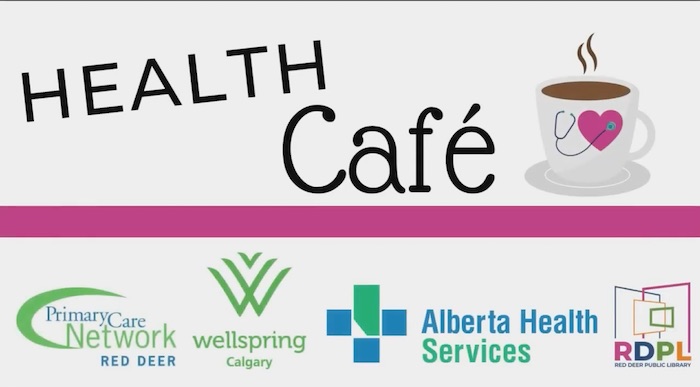Health
Practical health information available to everyone – Thanks to the Primary Care Network

Health Cafes offer loads of practical health information
Sessions hosted by the Primary Care Network run regularly throughout the year
By Mark Weber
The Primary Care Network’s Health Cafes tap into all kinds of practical health information for residents to utilize.
Hosted on a monthly basis, the sessions, which are currently held virtually, cover a wide gamut of topics that can make a real difference in people’s day-to-day lives, organizers say.
“We try to run the Health Cafes monthly, and we partner with the Red Deer Public Library,” explained Julia Vallance, the PCN’s program manager and a registered nurse. “They are all run virtually right now – you can either watch them via Facebook Live of you can go on afterwards and watch it from the library or the PCN Youtube page,” she said. “If you
join it ‘live’, it would be on the Red Deer Public Library’s Facebook page.”
‘Living Well with an Elevated Weight’ runs April 27 at 4 p.m. and will be hosted by Dr. Sereyrath Ngeth, Recreation Therapist Lynsey Hermary and Jonah Saringo, a family nurse. “Come learn refreshing and up-to-date information
to help you live happy and healthy at your best weight,” noted the web site. Topics range from weight stigma to treatment options including lifestyle, medication and surgery. “After that, we are running a Health Café with the City of Red Deer and Alberta Health Services on May 17 at 1 p.m., and it’s going to be on ‘Year of the Garden’,” said Vallance.
It’s all part of a City of Red Deer initiative to encourage folks to get outside and be more active by gardening through the spring and summer. “We are also going to have Denise Fredeen of Alberta Health Services’ Mental Health who will talk about how being outdoors can really impact people’s mental health in a positive way. We will also have one of our coaches, Lynsey Hermary, talk about some of the different things we can all do outside – other great options out in the community,’ she added.
And on June 15, a Health Café on ‘Post-partum Mental Health’ is set to start at 1 p.m. This session will be hosted by Ivy Parsons of AHS and PCN Family Nurse Michelle Abbott.
This 60-minute session is an introduction to what’s involved with the transition into motherhood.
“The post-partum adjustment period can be challenging as new mothers navigate low moods, sleepless nights and anxiety.”
“They’ll also be talking about what are normal expectations to have after having a baby. What are the common challenges women face? What is considered normal and what goes into the realm of the ‘not-so-normal’ – those kinds of topics,” she said.
Meanwhile, staff at the local office, located at 5120 47 St., also offer a range of ongoing workshops from Anxiety to Calm, Happiness Basics and Moving on With Persistent Pain to Relationships in Motion, Sleep and Journey Through Grief. Others include My Way to Health (formerly Health Basics), Strong and Steady (which focuses on bolstering one’s strength and flexibility), and H.E.A.R.T.S which has been designed to help families through the loss of a child during pregnancy or shortly after birth.
Several individual programs are available as well via the PCN, from help with diabetes, blood pressure and cholesterol to pharmacy queries to assistance with everything from quitting smoking to learning more about housing or financing.
Lorna Milkovich, the PCN’s executive director, noted that there is always an emphasis on designing the workshops to be primarily skills-based, interactive and experiential. Most are available in either four or eight-week modules as well.
A key goal these days is also to bolster awareness of all these programs, and to spread the word that they are completely accessible to the public at no charge as well, she said. And as Vallance pointed out, positive feedback as to the programs’ impact shows the information indeed can make a profound difference.
Another exciting new tool this year is the introduction of a downloadable publication called My Self-Care Journey, which is available on the PCN web site. Hard copies can also be picked up at the PCN office at no charge.
As Milkovich pointed out, the PCN is also a one-stop-shop for those looking for further information about health and wellness resources in the community.
For more about the PCN, check out reddeerpcn.com or call the office at 403-343-9100.
Business
I Was Hired To Root Out Bias At NIH. The Nation’s Health Research Agency Is Still Sick


From the Daily Caller News Foundation
By Joe Duarte
Federal agencies like the National Institutes of Health (NIH) continue to fund invalid, ideologically driven “scientific” research that subsidizes leftist activists and harms conservatives and the American people at large. There’s currently no plan to stop.
Conversely, NIH does not fund obvious research topics that would help the American people, because of institutional leftist bias.
While serving as a senior advisor at NIH, I discovered many active grants like these:
“Examining Anti-Racist Healing in Nature to Protect Telomeres of Transitional Age BIPOC for Health Equity” — Take minority teens to parks in a bid to reduce telomere erosion (the shortening of repetitive DNA sequences as we age). $3.8 million in five years and no results published – not surprising, given their absurd premise.
“Ecological Momentary Assessment of Racial/Ethnic Microaggressions and Cannabis Use among Black Adults” – This rests on an invalid leftist ideological concept – “microaggressions.” An example of a “microaggression” is a white person denying he’s racist. They can’t be validly measured since they’re simply defined into existence by Orwellian leftist ideology, with no attempt to discover the alleged aggressor’s motives.
“Influence of Social Media, Social Networks, and Misinformation on Vaccine Acceptance Among Black and Latinx Individuals” — from an activist who said the phrase “The coronavirus is genetically engineered” was “misinformation” and also conducted a bizarre, partisan study based entirely on a Trump tweet about recovering from COVID.
I will be leaving the great Walter Reed Medical Center today at 6:30 P.M. Feeling really good! Don’t be afraid of Covid. Don’t let it dominate your life. We have developed, under the Trump Administration, some really great drugs & knowledge. I feel better than I did 20 years ago!
— Donald J. Trump (@realDonaldTrump) October 5, 2020
The study claimed that people saw COVID as less “serious” after the tweet. I apologize for the flashback to when Democrats demanded everyone feel the exact level of COVID panic and anti-optimism they felt (and share their false beliefs on the efficacy of school closures, masks, and vaccines ). NIH funded this study and gave him another $651,586 in July for his new “misinformation” study, including $200,000 from the Office of the Director.
I’m a social psychologist who has focused on the harms of ideological bias in academic research. Our sensemaking institutions have been gashed by a cult political ideology that treats its conjectures and abstractions as descriptively true, without argument or even explanation, and enforces conformity with inhumane psychologizing and ostracism. This ideology – which dominates academia and NIH – poses an unprecedented threat to our connection to reality, and thus to science, by vaporizing the distinction between descriptive reality and ideological tenets.
In March, I emailed Jay Bhattacharya, Director of NIH, and pitched him on how I could build an objective framework to eliminate ideological bias in NIH-funded research.
Jay seemed to agree with my analysis. We spoke on the phone, and I started in May as a senior advisor to Jay in the Office of the Director (NIH-OD).
I never heard from Jay again beyond a couple of cursory replies.
For four months, I read tons of grants, passed a lengthy federal background check, started to build the pieces, and contacted Jay about once a week with questions, follow-up, and example grants. Dead air – he was ghosting me.
Jay also bizarrely deleted the last two months’ worth of my messages to him but kept the older ones. I’d sent him a two-page framework summary, asked if I should keep working on it, and also asked if I’d done something wrong, given his persistent lack of response. No response.
In September, the contractors working at NIH-OD, me included, were laid off. No explanation was given.
I have no idea what happened here. It’s been the strangest and most unprofessional experience of my career.
The result is that NIH is still funding ideological, scientifically invalid research and will continue to ignore major topics because of leftist bias. We have a precious opportunity for lasting reform, and that opportunity will be lost without a systematic approach to eliminating ideology in science.
What’s happened so far is that DOGE cut some grants earlier this year, after a search for DEI terms. It was a good first step but caught some false positives and missed most of the ideological research, including many grants premised on “microaggressions,” “systemic racism,” “intersectionality,” and other proprietary, question-begging leftist terms. Leftist academics are already adapting by changing their terminology – this meme is popular on Bluesky:
DOGE didn’t have the right search terms, and a systematic, objective anti-bias framework is necessary to do the job. It’s also more legally resilient and persuasive to reachable insiders — there’s no way to reform a huge bureaucracy without getting buy-in from some insiders (yes, you also have to fire some people). This mission requires empowered people at every funding agency who are thoroughly familiar with leftist ideology, can cleanly define “ideology,” and build robust frameworks to remove it from scientific research.
My framework identifies four areas of bias so far:
- Ideological research
- Rigged research
- Ideological denial of science / suppression of data
- Missing research – research that would happen if not for leftist bias
The missing research at NIH likely hurts the most — e.g. American men commit suicide at unusually high rates, especially white and American Indian men, yet NIH funds no research on this. But they do fund “Hypertension Self-management in Refugees Living in San Diego.”
Similarly, NIH is AWOL on the health benefits of religious observance and prayer, a promising area of research that Muslim countries are taking the lead on. These two gaping holes suggest that NIH is indifferent to the American people and even culturally and ideologically hostile them.
Joe Duarte grew up in small copper-mining towns in Southern Arizona, earned his PhD in social psychology, and focuses on political bias in media and academic research. You can find his work here, find him on X here, and contact him at gravity at protonmail.com.
Great Reset
EXCLUSIVE: A Provincial RCMP Veterans’ Association IS TARGETING VETERANS with Euthanasia

I just received an email from a retired member of the RCMP…
“I served for 32 years on the West Coast and retired in 2019. As a Christian and a retired member of the RCMP I wanted to share this with you. I’m trying to wrap my head around this shocking email. I’m shocked it’s come to this.” – L.K
SATURDAY, NOV. 22, 2025
1:30-3:00 PM CHURCH HALL, OLD SACKVILLE ROAD, MIDDLE SACVILLE, NS, B4E 1R3.
On November 20th, an email quietly dropped into the inboxes of Nova Scotia RCMP veterans. Standard, polite and in true Canadian fashion formal and sanitized. This was no mistake, this wasn’t information. This was something different.
This was grooming.
Yes I said it, coercion.
The “opportunity” was a “Medical Assistance in Dying (MAID) Program in Nova Scotia”
This is a state-aligned institutions normalizing death as a service to the very people they already failed to support in life .This was a information session, to “educate” veterans who’s rates of PTSD and suicidality were already sky hight. How they can apply or use MAID.
The invited speaker?
Dr. Gordon Gubitz
Location? None other than a place of worship, a church hall. The target audience?
VETERANS.
This is what I’ve been talking about, welcome to the soft-coercive stage of Canada’s MAID regime.
Let’s meet Dr. Gordon Gubitz. The same Dr. Gubitz whois a MAID assessor and provider (killer) is the Clinical Lead for MAID in Nova Scotia, which means MAID is his not only his passion but spends his work focused on ending lives. This “Dr” sits on the board of CAMAP, the pro death organization that creates all the pathways for Canadians to be killed while manipulating the court systems in their favour. More death to them is the goal. This “Dr” helped write the national MAID curriculum and trains doctors on how to present MAID as a “care option.” This guy is literally a death pusher and peddler of the dark.
Think of him a the drug dealer for death.
They didn’t invite a trauma specialist.
They didn’t invite a palliative expert.
They didn’t invite a police mental-health advocate.
They didn’t invite a mental health expert
They didn’t invite a Dr who looks at psychedelic assisted therapy
They didn’t invite hope. They only invited death.
Kelsi Sheren is a reader-supported publication.
To receive new posts and support my work, consider becoming a free or paid subscriber.
Nova Scotia RCMP veterans invited a man whose job is to facilitate, provide and promote nothing but death, and whose organization teaches clinicians how to introduce MAID (assisted SUICIDE) to patients who didn’t ask for it, bring it up or want it in their life.
Let me explain something, If you’re a veteran dealing with PTSD, chronic pain, TBI, disability, or bureaucracy-induced despair, this isn’t “education.”
This is targeted psychological pressure.
Coercion, CAMAP and Dying with Dignity’s claim to fame.
No one will say the words out loud. No one will write “we think some of you should consider dying.”
They don’t need to, when just dangling the carrot is good enough to get the job done.
Coercion today is subtle, normalized in the community. It’s dressed up like Christmas cookies in a church call, framed as loving “support” being held by one of the most prolific death pushers in the game.
Simply funnelling veterans into the system one “information session” at a time. Like cattle through the gates of hell, with CAMAP waiting in the shadows. This time not with a bold gun. They would see that as “too humane”, but with a pen, check list, a needle and a paralytic.
Canada already proved it’s willing to dangle MAID (assisted suicide, murder, early death) in front of struggling veterans. I helped break these stories and bring our veterans stories to the masses. I’m interviewing more by the day, who’ve been offered death over life illegally.
VAC employees got caught offering MAID to veterans who never asked for it, including one trying to get a wheelchair ramp, my friend Christine.
So do me a favour spare us the “this is innocent” act.
Veterans have been coerced before, and it’s happening again right in front of your faces. Now the RCMP Veterans’ Association is rolling out the red carpet for the prevailers of death. The dark ones who feed on the souls of those who couldn’t bare to take another breath.
This is not an “opportunity.”
This is a sales pitch.
And the product is your death.
People keep asking me why veterans are being targeting? Because they’re the perfect targets, don’t you see?
Kelsi Sheren is a reader-supported publication.
To receive new posts and support my work, consider becoming a free or paid subscriber.
Veterans, on the daily are dealing with chronic pain, combat trauma, moral injury, sanctuary trauma, disability, suicidality, lack of services, financial strain, bureaucratic obstruction and the government doesn’t just know know it, it caused it and it supports it and so do the MAID, pro death cult architects.
The MAID lobby knows veterans are “high-yield” candidates, and not because they want to die, but because the system has already worn them down, like water slowly dripping over the rocks. The Liberal government just cut OVER 4 BILLION in care for veterans. Veterans aren’t being shown the full picture, they aren’t given any hope. They’re being shown the early exit. What we call in some circles, being shown the path to “self-selection.”
This RCMP veterans email is a soft-touch version of coercion if I’ve ever seen one.
“We’re not telling you to choose MAID… we’re just putting the idea on the table, in a friendly community space, with a trusted expert who helps design the national MAID system.” Who’s job is to provide you with all the pathways to wanting to kill yourself.
That’s how you manipulate a vulnerable population without leaving fingerprints.
Dr. Gubitz isn’t neutral. He is the system.
Gubitz isn’t walking into that church as an independent medical educator.
He is walking in as the clinical gatekeeper for MAID in Nova Scotia, IE. HELL. He’s nothing more than one of the ideological engines behind national MAID training. A CAMAP insider, the organization pushing to expand and normalize MAID (assisted SUICIDE) at every level of “healthcare,” if you can even call it that anymore. CAMAP literally publishes guidance on how clinicians should bring up MAID as a care option. Not reactively. Proactively.
When you pair a vulnerable group with a man trained to present MAID as “equitable access,” your “information session” becomes a recruitment funnel.
HOW IS EVERYONE OK WITH THIS?
You are directly influencing and priming veterans for death under the banner of “support.” It’s an illusion, it’s predatory behaviour! It’s not informed consent in any way. It’s manipulation.
And holding it in a church? That’s strategic psychological laundering.
Churches are trusted spaces. They lower defences, help you to open your mind. Churches to most signal moral legitimacy so hosting a MAID talk in a church hall tells veterans “your community approves. Your faith approves this is acceptable, this is dignified, you don’t have to fight or feel guilty, ”
It cloaks a controversial, ethically fraught practice in community warmth. It’s taking advantage of the safety and sanctity of church.
That’s not an accident.
It’s a tactic.
This wreaks of propaganda wrapped in hospitality.
This is the playbook of a system that wants to solve suffering by eliminating the sufferer.
Canada won’t fix the care gaps. It won’t fix the mental-health crisis. It won’t fix VAC’s failures and it sure as hell won’t fix disability supports.
But it will happily fund a national MAID curriculum, expand eligibility, remove guardrails, and now apparently send MAID providers on a tour of vulnerable communities.
Veterans have always been canaries in Canada’s moral coal mine.
If the state can normalize MAID to the people who wore its uniform, it can normalize it to anyone. And that’s the point.
This story isn’t about one email. It’s about a culture shift engineered from the top down.
This is how you create acceptance – – >
First, make MAID look compassionate.
Then, bring it into community spaces.
Then, present to vulnerable groups.
Then, call it “support.”
Then, remove the stigma.
Then, remove the safeguards.
Then, expand eligibility.
Then, tell the public: “People are choosing MAID because it’s dignified.”
They leave out the part where the system helped manufacture despair.
Veterans deserve better than an invitation to die.
They deserve care, treatment, advocacy, and someone who doesn’t treat their suffering as a problem to be erased.
Not a church basement with coffee and a state-aligned MAID architect explaining their “options.”
This email isn’t benign.
It is a warning, one Canada should have heeded years ago.
If the country is comfortable offering death to the people who served it, it’s comfortable offering it to anyone.
And that’s exactly what’s happening.
Please feel free to call or email them and let them know how this makes you feel.
KELSI SHEREN
– – – – – – – – – – – – –
One Time Donation! – Paypal – https://paypal.me/
Buy me a coffee! – https://buymeacoffee.com/
Youtube – https://www.youtube.com/@
Substack: https://substack.com/@
TikTok – https://x.com/KelsiBurns
Listen on Spotify:
|
|
The Kelsi Sheren Perspective
Kelsi Sheren Podcast |
SUPPORT OUR SPONSORS
– – – – – – – – – – – –
Ketone IQ- 30% off with code KELSI – https://ketone.com/KELSI
Good Livin – 20% off with code KELSI – https://www.itsgoodlivin.com/?
Brass & Unity – 20% off with code UNITY – http://brassandunity.com
Kelsi Sheren is a reader-supported publication.
To receive new posts and support my work, consider becoming a free or paid subscriber.
-

 COVID-1912 hours ago
COVID-1912 hours agoNew report warns Ottawa’s ‘nudge’ unit erodes democracy and public trust
-

 Great Reset2 days ago
Great Reset2 days agoEXCLUSIVE: A Provincial RCMP Veterans’ Association IS TARGETING VETERANS with Euthanasia
-

 Health2 days ago
Health2 days agoDisabled Canadians petition Parliament to reverse MAiD for non-terminal conditions
-

 Daily Caller2 days ago
Daily Caller2 days agoSpreading Sedition? Media Defends Democrats Calling On Soldiers And Officers To Defy Chain Of Command
-

 Crime1 day ago
Crime1 day agoHow Global Organized Crime Took Root In Canada
-

 Business2 days ago
Business2 days agoThe Payout Path For Indigenous Claims Is Now National Policy
-

 Digital ID2 days ago
Digital ID2 days agoLeslyn Lewis urges fellow MPs to oppose Liberal push for mandatory digital IDs
-

 Energy1 day ago
Energy1 day agoExpanding Canadian energy production could help lower global emissions









